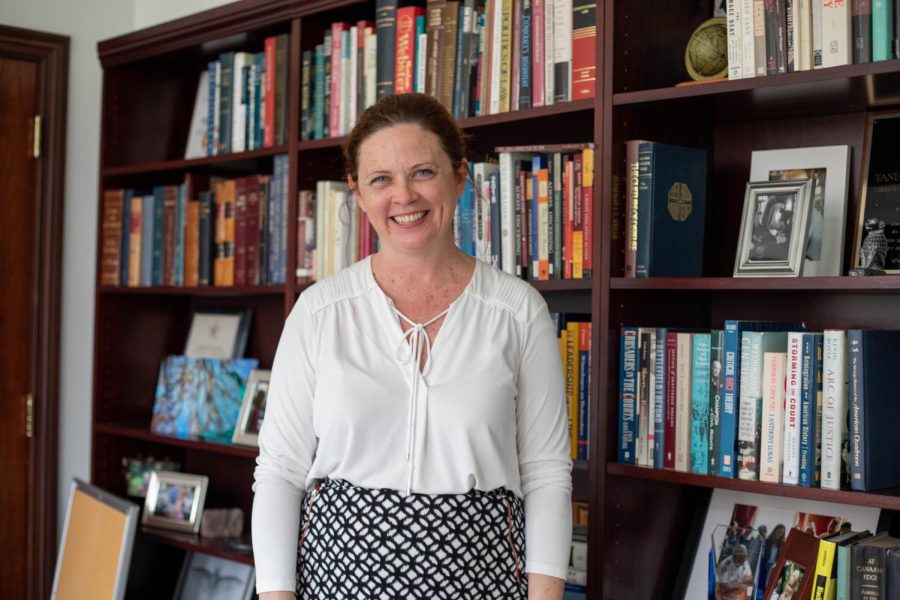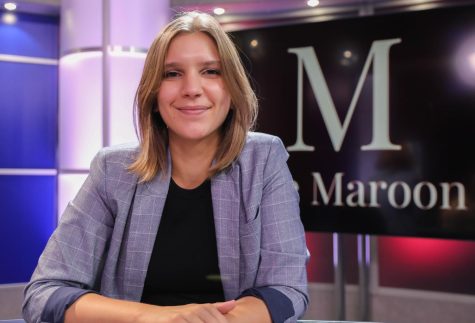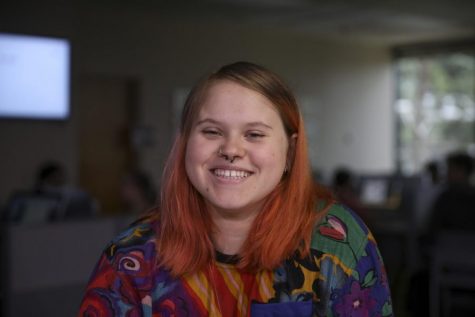Loyola’s first female, layperson president reflects on her term
President Tania Tetlow stands in front of her bookcase in her office on the second floor of Marquette Hall on Feb.16, 2022. Tetlow is leaving Loyola at the end of the semester to be Fordham’s first female, layperson president.
March 10, 2022
“Bittersweet beyond measure.”
That’s how University President Tania Tetlow described her feelings about leaving behind Loyola and the city she has called home for most of her life. Before Tetlow officially announced that she was to become Fordham University’s newest president, she didn’t make this decision lightly. She said she spent many days praying and talking to her Jesuit uncle.
“He said, ‘The Lord will tell you.’ I said, ‘Well, the Lord is arguing both sides of the question,’” she said.
Tetlow said she agonized over the decision and that it was never about wanting to leave Loyola but rather about further serving Jesuit higher education in the world. When she accepted Fordham’s offer to also become its first female, layperson president, she knew her obligation was to do just that.
“This was not something that anyone close to me would have predicted me being willing to do because I am so attached to Loyola and to New Orleans,” she said.
Although she is moving to her new position this summer, Tetlow isn’t finished with Loyola or New Orleans. In fact, she said she recently finished working on her Fordham calendar and made sure to include the “additional religious holidays of Mardi Gras and Jazz Fest.” Her husband’s business is here as are her mother and sister, so she said she isn’t giving up New Orleans altogether.
Provost Tanuja Singh knows that it won’t be long before Tetlow comes back to visit.
“While she’s going to take a job, I don’t think that she’s leaving us,” she said. “I think that’s a really important distinction because her heart in a lot of ways lives in New Orleans.”
In her final months at Loyola, Tetlow will be transitioning the university into the hands of its interim president, The Rev. Justin Daffron S.J., and she said she’ll be moving faster than ever to finish everything she wants done.
“There’s nothing like a deadline, as you students know, to really up your game,” she said.
Tetlow said she wants to nurture the “seeds” she’s already planted at Loyola in hopes that they’ll “bear fruit for the next several years.” She said this includes her measures to improve campus sustainability, diversity, and admissions as defined by the university’s strategic plan 2020.
However, she said that the work of higher education is always ongoing.
“We have to keep planting seeds,” she said, offering examples like creating new graduate programs that build on Loyola’s existing strengths, working to finance another dorm on campus to accommodate Loyola’s growing student body, and transitioning from LORA to a more efficient operating system.
Because her colleagues in administration are remaining at Loyola, she said there will be continuity and momentum to build off of in the future as Loyola works toward these goals.
“I feel like we’re heading in the right direction in ways that are thrilling,” she said.
Singh believes Tetlow has prepared Loyola well for its future without her.
“While I’m sad to see her go, I think we have an excellent leadership team that will continue to work on the plans we have developed together,” she said.
Although Tetlow has some unfinished business at Loyola, she’s leaving behind a legacy defined by her ability to overcome challenges. Tetlow inherited a university that was put on financial probation just six months into her tenure as president following several years of deep budget deficits that were cutting into the university’s endowment. She said she’s very proud of getting Loyola financially back on its feet just one year later.
Carol Ann MacGregor, former vice provost, worked closely with Tetlow during that process.
“(Tetlow) represented the university tremendously well,” she said.
MacGregor said Tetlow “came in as a breath of fresh air” when the university needed to make changes. She said she found it most impressive that Tetlow took on the presidency at all and that many qualified people like Tetlow would have looked at Loyola’s problems and run the other way.
“She embraced the challenge and really dove in from day one to start rectifying some of the things that needed to be rectified in order to get us back in good standing with (Southern Association of Colleges and Schools Commission on Colleges),” she said.
During her presidency, Tetlow faced two hurricanes, one of which, Hurricane Ida, brought damage to the university. Tetlow also endured the COVID-19 pandemic. Throughout these difficulties, she kept constant and open communication with the Loyola community which made her stand out from the previous president, according to Dane S. Ciolino, the Alvin R. Christovich distinguished professor of law.
“I always found her periodic emails to the community to be thoughtful, witty, and pertinent,” he said. “I thought it was excellent.”
Along with open communication, Singh said Tetlow is also an open, authentic leader who was always inspiring her to do more.
“You want to do better not because she’s telling you to do better but because the vision she shares with all of us is really inspirational and aspirational,” she said.
During Tetlow’s presidency, Loyola has seen enrollment growth and welcomed the biggest, most diverse freshman class in its history as of fall 2021. She has overseen the development of new academic programs, like the undergraduate nursing, neuroscience, and cybersecurity programs, and the completion of Loyola’s Faith in the Future fundraising campaign which will go on to fund scholarships and endowed professorships, among other things. Loyola’s Women’s Leadership Academy was also established during Tetlow’s presidency, providing women in the New Orleans community with professional development opportunities.
MacGregor thinks providing these kinds of opportunities for women was a big marker of Tetlow’s presidency.
“She was a tremendous champion of women leaders,” she said, noting that two high-ranking open positions in Loyola administration, chief operating officer and provost, were filled by women during Tetlow’s presidency.
MacGregor said it was special that Tetlow used her time at Loyola to set up the next generation of women leaders in higher education.
“The top sort of three leaders at the institution are all amazing women, and I think that will be a legacy of hers,” she said.
Singh said Tetlow’s strong leadership skills were part of why she came to Loyola and that it’s rare to see so many women in top leadership positions at a university.
“She is not only good at what she does, she is also supporting, hiring, and mentoring women leaders such as myself,” Singh said.
Tetlow thinks another part of her Loyola legacy is helping the university “get its swagger back” as it dealt with the many hurdles of the past few years. Although her tenure at Loyola lasted only four years, Tetlow doesn’t think that made it any less impactful.
“I think the days of 20-year presidencies are over,” she said. “It becomes a sprint to measure less in how long you stay than in how intense your service is and what you can achieve.”
Her days at Loyola may be coming to an end soon, but Tetlow has no concerns about Loyola’s future.
“We just have so much momentum now. I’m not worried about that continuing,” she said.









